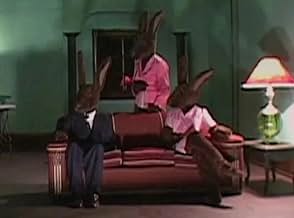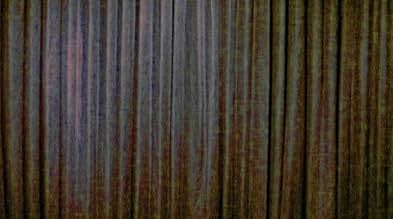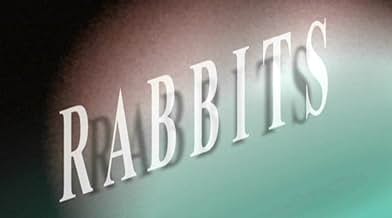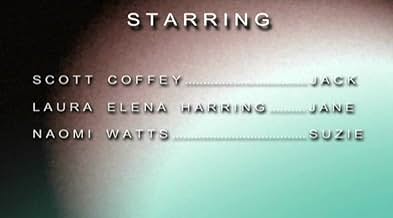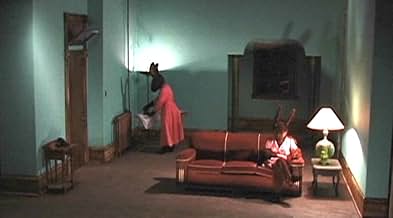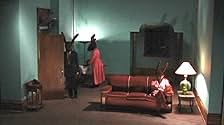CALIFICACIÓN DE IMDb
6.9/10
8.9 k
TU CALIFICACIÓN
En una ciudad sin nombre inundada por una lluvia continua, tres conejos viven con un terrible misterio.En una ciudad sin nombre inundada por una lluvia continua, tres conejos viven con un terrible misterio.En una ciudad sin nombre inundada por una lluvia continua, tres conejos viven con un terrible misterio.
- Dirección
- Guionista
- Elenco
- Dirección
- Guionista
- Todo el elenco y el equipo
- Producción, taquilla y más en IMDbPro
Opiniones destacadas
Lynch really elevated my opinion of him here. This is very, very well constructed. It is the highest art.
That means that any "explanation" will be worthless. You can read some other material to discover something of what you will see.
Its unsettling and strange, hypnotic and lyrical. That it is in several "episodes" is all a part of how certain familiar forms are subverted to give us something that has identity and also has a sort of meta-identity defined by deviance from the expected.
My observation will be highly personal. I see this as a sort of "Rosencrantz and Guildenstern" but instead of referencing "Hamlet" engages "Alice in Wonderland." It fits, especially if you are inclined as I am to blow Alice into something as world-swallowing as Hamlet. Where Hamlet is all about what it means to sit in the world, Alice works at more refined level, being all about what it means to carry a name in the world.
One is about being and the other about what we see and acknowledge about being. Its this second conceptual space that Lynch inhabits, always has. His "firewalking" TeeVee stuff bends notions of representation and discovery, the amusement being not in what we see, but in the difference between what we expect to see.
Let's look at the entire vocabulary he has toyed with. First, he acknowledges the audience (laugh track), camera (static but in and out of focus), narrative (drawn more overtly by its fragmentation), framing (with very formal, abstract composition) and "acting," which here consists more of pauses and empty spaces than anything we normally associate with acting.
And then there's the bending of the form. We have a demon that appears twice. Its noir drawn tightly, especially since there is a hint that the demon or his avatar as perhaps a "lost dog" is driving the entire situation.
And then we have three "performances," one each by the three characters. These are accompanied by an ignited set, literally ignited. The performances, which each occupy an episode, are pretty transcendent in terms of what we would see in an ordinary drama. In such a case, each would "solo" in such a way that their soul was revealed. Its the challenge of the writer to weave this into events in such a way that we don't see the performer revealing his character overtly. This is different; all pretense is removed. The character enters and opens its heart with no narrative baggage. What the character tells us actually has more information about context than the surrounding context provides.
Ted's Evaluation -- 3 of 3: Worth watching.
That means that any "explanation" will be worthless. You can read some other material to discover something of what you will see.
Its unsettling and strange, hypnotic and lyrical. That it is in several "episodes" is all a part of how certain familiar forms are subverted to give us something that has identity and also has a sort of meta-identity defined by deviance from the expected.
My observation will be highly personal. I see this as a sort of "Rosencrantz and Guildenstern" but instead of referencing "Hamlet" engages "Alice in Wonderland." It fits, especially if you are inclined as I am to blow Alice into something as world-swallowing as Hamlet. Where Hamlet is all about what it means to sit in the world, Alice works at more refined level, being all about what it means to carry a name in the world.
One is about being and the other about what we see and acknowledge about being. Its this second conceptual space that Lynch inhabits, always has. His "firewalking" TeeVee stuff bends notions of representation and discovery, the amusement being not in what we see, but in the difference between what we expect to see.
Let's look at the entire vocabulary he has toyed with. First, he acknowledges the audience (laugh track), camera (static but in and out of focus), narrative (drawn more overtly by its fragmentation), framing (with very formal, abstract composition) and "acting," which here consists more of pauses and empty spaces than anything we normally associate with acting.
And then there's the bending of the form. We have a demon that appears twice. Its noir drawn tightly, especially since there is a hint that the demon or his avatar as perhaps a "lost dog" is driving the entire situation.
And then we have three "performances," one each by the three characters. These are accompanied by an ignited set, literally ignited. The performances, which each occupy an episode, are pretty transcendent in terms of what we would see in an ordinary drama. In such a case, each would "solo" in such a way that their soul was revealed. Its the challenge of the writer to weave this into events in such a way that we don't see the performer revealing his character overtly. This is different; all pretense is removed. The character enters and opens its heart with no narrative baggage. What the character tells us actually has more information about context than the surrounding context provides.
Ted's Evaluation -- 3 of 3: Worth watching.
A slow, stylish, eerie and extremely interesting story set "in a city deluged by constant rain where three rabbits live with a constant mystery". Mr Lynch has a great talent for establishing atmosphere and this series is soaked with his trademark (weird) mood. When I watched the first episode I was not sure whether to laugh or be baffled at what I was seeing. 3 Rabbits talk out of sequence, an unseen audience claps whenever one of them enters the room and laughs (not because something funny is said, but at the misery of the rabbits), a candle burns in the corner, a demon face chants something undecipherable (reminds me of the litanies of Satan, the camera seems to be disturbed in the beginning of the 7 out of 8 episodes by something I can only guess to be a spirit. We hear footsteps, the door sometimes opens and the phone even rings. All to the frustration of the rabbits. I noticed a lot of people have tried to figure out what Rabbits is about and my take on it is pretty simple. Firstly, this wasn't the first time I have seen something like this, though this is definitely very well made. I read a book a very long time ago whose title I cannot remember about 2 kids who were put in a scenario similar to this rabbit house and were observed everyday by their captures. The 2 children (I only remember one child called Mavis) were unaware they were being watched and as far as they knew, they had a normal life (went out, watched TV etc) except they didn't in real life. Everything was in their mind. This seems similar to this story. The rabbits could be 'prisoners' who are being observed or kept by someone (the man in the green suit). There is however how they react to the audience (whenever they enter the room and the audience claps, they wait until the applause is finished and continue to sit down) so they are aware they are being watched. According to their dialogue, it seems to me they were once human, "Jane- were you blond?" but it does seem like they remember or who they were. They refer to each other by human names, but they seem confused or disturbed by their situation, "I wish they'd go away", probably referring to the unseen audience. The last episode offers a good climax but not a conclusion. Or is it? Are the rabbits unable to figure out a way out of their misery...or is this their reality as it always has been? Like the book I read, the children never did escape their house, but they did figure out they were not living a 'normal' life. Lynch has never been one to offer a comfortable conclusion to his work- so I would not be surprised if this is the end for his rabbits.
Here, we get a David Lynch-ized sitcom set and our three characters, dressed in Rabbit suits. The "mystery" is knawing at these characters although what they say is often incomprehensable. On top of this, the piece is supported with a laugh track. I know what you're thinking. It's an absurdist film, right? No.
I don't know how they did it with these elements that would seem laughable from afar, but you know what? You turn off the lights in your room and you watch all eight parts to this, and you'll have nightmares for a week. David Lynch can make anything terrifying. A complete surprise in mood. You won't forget it.
I don't know how they did it with these elements that would seem laughable from afar, but you know what? You turn off the lights in your room and you watch all eight parts to this, and you'll have nightmares for a week. David Lynch can make anything terrifying. A complete surprise in mood. You won't forget it.
Okay, I have been watching David Lynch's work since Twin Peaks. I have seen everything he has done from Eraserhead to Mulholland Dr. It's taken me 3 years to find a copy of RABBITS to watch and I must say... Lynch never ceases to confuse me.
I understand why some people think Lynch is overly self-indulgent, but I don't think that is a reason to hate him and his work. Lost Highway and Mulholland Dr. are two of the greatest film ever, but they are not for everybody.
RABBITS is different than his films, and I am not going to act like I understand RABBITS or pretend that I found my own interpretation to the series. I don't know what I've just seen, I can't even tell you if it was self-indulgent crap or a work of genius, all I can say is if you like Lynch and want to see something different than anything you'll ever see anywhere else, than enjoy:)
I understand why some people think Lynch is overly self-indulgent, but I don't think that is a reason to hate him and his work. Lost Highway and Mulholland Dr. are two of the greatest film ever, but they are not for everybody.
RABBITS is different than his films, and I am not going to act like I understand RABBITS or pretend that I found my own interpretation to the series. I don't know what I've just seen, I can't even tell you if it was self-indulgent crap or a work of genius, all I can say is if you like Lynch and want to see something different than anything you'll ever see anywhere else, than enjoy:)
The rabbits are us in the way we live our entire lives separated from death only by our domestic routines of normalcy and our denial. Rabbits are bred for the slaughter; they live their entire lives in their little cage, surrounded by, and fed by, the very same people who will someday unthinkingly break their necks.
They're traumatized by the collective memory of past relatives being snatched from their cages while the characters themselves were still too young to fully comprehend the severity and reality of what was happening. The horrors they witnessed so long ago are now just an underlying feeling that something is wrong. They, and we, live their entire lives among death, ignorantly and purposely oblivious of it, until the one day when they are able to ignore it no more, until the day it is their turn.
That's what sense I made out of it anyway.
They're traumatized by the collective memory of past relatives being snatched from their cages while the characters themselves were still too young to fully comprehend the severity and reality of what was happening. The horrors they witnessed so long ago are now just an underlying feeling that something is wrong. They, and we, live their entire lives among death, ignorantly and purposely oblivious of it, until the one day when they are able to ignore it no more, until the day it is their turn.
That's what sense I made out of it anyway.
¿Sabías que…?
- TriviaDescribed by Lynch as a 9 episode sitcom.
- ConexionesFeatured in El imperio (2006)
Selecciones populares
Inicia sesión para calificar y agrega a la lista de videos para obtener recomendaciones personalizadas
Detalles
- Tiempo de ejecución
- 43min
- Color
- Relación de aspecto
- 1.78 : 1
Contribuir a esta página
Sugiere una edición o agrega el contenido que falta

